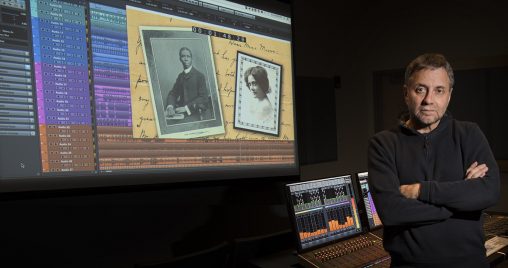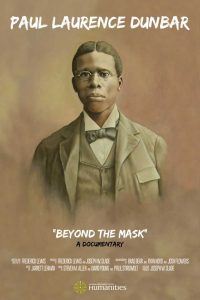
Filmmaker Frederick Lewis will introduce “Paul Laurence Dunbar: Beyond the Mask” and lead a post-screening discussion on Feb. 17 at 3 p.m. in 441 Dunbar Library and on Webex.
Wright State University Libraries will kick off its Paul Laurence Dunbar celebration with a special screening of a documentary film on the Dayton native’s life and writing career.
“Paul Laurence Dunbar: Beyond the Mask” will be screened on Thursday, Feb. 17, at 3 p.m. in 441 Dunbar Library and on Webex. Online registration is required.
Frederick Lewis, the documentary’s writer and director, will introduce the film and lead a post-screening discussion.
The screening and discussion are co-sponsored by the Friends of the Libraries.
The program is part of Paul Laurence Dunbar: 150, the University Libraries’ series celebrating the 150th anniversary of Dunbar’s birth in Dayton on June 27, 1872.
Dunbar was a prolific writer and one of the first influential Black poets in American literature. He was internationally acclaimed for his dialectic poetry in collections such as “Majors and Minors” and “Lyrics of Lowly Life.” His best-known poems are “We Wear the Mask” and “Sympathy” (the first line of which became the title for Maya Angelou’s “I Know Why the Caged Bird Sings”).
The two-hour documentary “Paul Laurence Dunbar: Beyond the Mask” highlights Dunbar’s personal life and career.
“It was an extraordinary life, and a painfully short one,” said Lewis, a professor in the School of Media Arts and Studies and director of the Screenwriting and Documentary Storytelling Programs in Ireland and Spain at Ohio University.
As an English major at the University of Massachusetts, Lewis said, he knew Dunbar through the two or three poems of his that are always published in anthologies of American literature.
“Truth is, I knew nothing about the complexity and tragedy of his life,” Lewis said. “The project became an exploration of the times in which he lived.”
 “Paul Laurence Dunbar: Beyond the Mask” explores Dunbar’s boyhood friendship with Wilbur and Orville Wright; his relationships with luminaries such as William Dean Howells, Frederick Douglass and Booker T. Washington; his tumultuous marriage; the tension between his dialect and standard poetry; and the multiple cultural legacies he left behind.
“Paul Laurence Dunbar: Beyond the Mask” explores Dunbar’s boyhood friendship with Wilbur and Orville Wright; his relationships with luminaries such as William Dean Howells, Frederick Douglass and Booker T. Washington; his tumultuous marriage; the tension between his dialect and standard poetry; and the multiple cultural legacies he left behind.
“I did a deep dive into the period of Reconstruction and the beginnings of the Jim Crow era,” Lewis said. “Dunbar’s story is really the story of the African American experience at the turn of the century.”
Lewis worked on the film for more than 10 years, which is a production of the Central Region Humanities Center at Ohio University. The documentary was originally completed in 2017 and released a year later.
Lewis said he “really became obsessed with doing Dunbar justice” and considered the original version a “bit rushed” though well received at screenings held at the Library of Congress, the National Civil Rights Museum in Memphis and many other venues. The film also aired on many PBS affiliates and was screened at film festivals in Toronto, San Francisco, Los Angeles, New York and Paris.
“But I have continued to search for stronger visual materials and to make other improvements during these pandemic years,” Lewis said. “I am quite pleased with this new iteration.”
Other Paul Laurence Dunbar: 150 events
Paul Laurence Dunbar: 150 will also include:
- Discussion of Dunbar’s novel “The Sport of the Gods” on March 8
- Visions of Dunbar, a poetry and art event for Wright State and local high school students on April 15
- Friends of the Libraries Virtual “Lunch-In,” featuring a dramatic presentation and talk on Dunbar’s life, on April 20
- Silver Melted into Sound, a music festival hosted by the School of Music, supporting the work of diverse composers, on May 6

 Adventures await
Adventures await  Wright State to expand nursing facilities to meet workforce needs and prepare more graduates for in-demand careers
Wright State to expand nursing facilities to meet workforce needs and prepare more graduates for in-demand careers  Wright State student-athletes make a lasting impact on local family with more to come
Wright State student-athletes make a lasting impact on local family with more to come  Wright State names Rajneesh Suri dean of Raj Soin College of Business
Wright State names Rajneesh Suri dean of Raj Soin College of Business  ‘Only in New York,’ born at Wright State
‘Only in New York,’ born at Wright State 